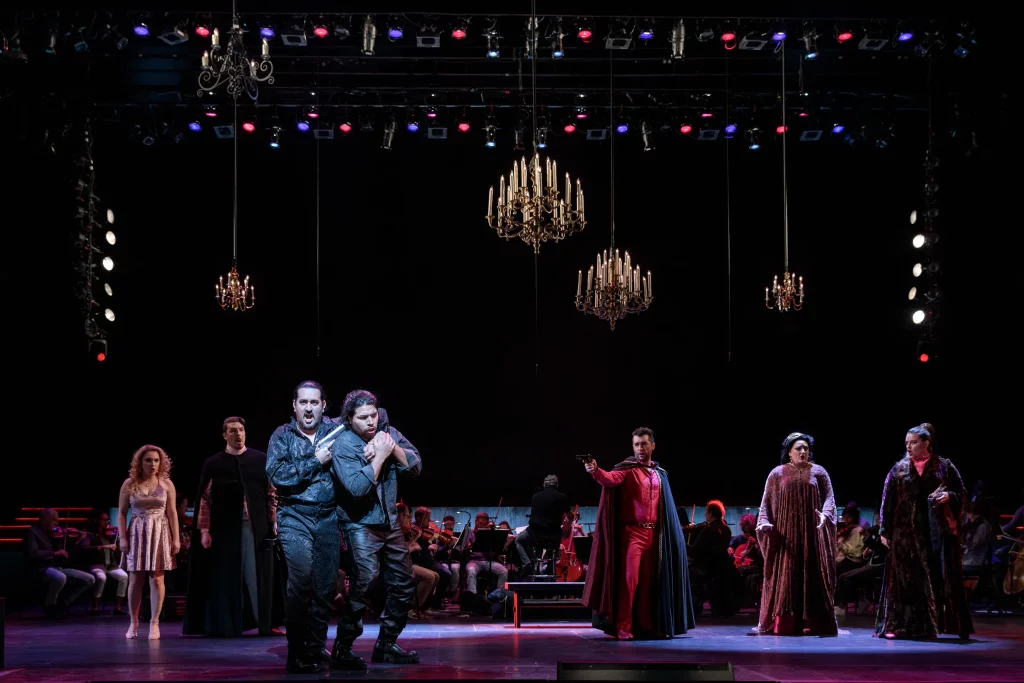San Diego Opera Opens Brilliant ‘Don Giovanni’ at Civic Theatre

(l. to r.) Ashley Fabian, Stefan Egerstrom, Germán Enrique Alcántara, Ethan Vincent, Alex McKissick, Tasha Koontz & Megan Moore [photo (c.) Karli Cadel]
Fortunately, San Diego Opera General Director David Bennett engaged a first-rate cast for the Don Giovanni that opened Friday at San Diego Civic Theatre, and he wisely brought back Kyle Lang to the company as stage director. Lang has directed several recent productions for San Diego Opera, including last season’s acclaimed Puccini duo of Suor Angelica and Gianni Schicchi.
For this Mozart opera, Bennett decided to place the orchestra onstage without a set, an arrangement the company attempted with mixed results for its 2019 production of Verdi’s Aïda, an opera situated in exotic, specific Egyptian locations, includng a spectacular military procession. The settings in Don Giovanni, however, are generic: e.g., a street scene, a banquet hall, a cemetery, and most scenes take place at night, so we did not miss colorful sets. Lang’s use of spotlights that instantly illuminated a character launching into an aria, the clever design work of Chris Rynne, kept the opera’s focus on the opera’s characters and their complex relationships. And that is what makes Don Giovanni more than the simple-minded morality tale of divine retribution for earthly misdeeds upon which Mozart and his librettist Lorenzo da Ponte built their sophisticated magnum opus.
Soprano Tasha Koontz and tenor Alex McKissick gave the opera’s nobility, Donna Anna and Don Ottavio, the stature and ample vocal prowess appropriate to their social station. From their Act I duet, “Fuggi, crudele,” they commanded their roles with eloquent phrasing and bravura flights through the composer’s demanding fioriture. Koontz subtly navigated her separation from Don Ottavio at the close of the opera with an emotionally devastating “Non mi dir,” and McKissick communicated a fortitude in Don Ottavio that is too rarely encountered in interpretations of this role, especially through his masterful “Il mio tesoro.”
The other two women in the cast, mezzo-soprano Megan Moore as Donna Elvira and soprano Ashley Fabian as Zerlina, equaled Koontz’s impressive vocal allure. Although Da Ponte imposes embarrassing charades on Donna Elvira, Moore maintained her ‘sadder but wiser’ dignity, eloquently expressed in her early aria “Ah, chi mi dice mai.” Fabian dispensed with the typical portrayal of Zerlina as the naive and easily manipulated young beauty and gave her character welcome self-assurance, not to mention an irresistible shimmering vocal line. And in her aria that comforts the battered Masetto, “Vedrai, carino,” she hinted at the vixen beneath her sweet exterior.
Germán Enrique Alcántara’s hearty baritone empowered Don Giovanni with the necessary bluster required for his numerous audacious encounters, although his attempted seductions seemed too smarmy for a rake with his record of conquests. His dramatically striking encounter with the ghost of the Commendatore in the opera’s final scene, however, struck me with greater terror than any other Don Giovanni production I have experienced over a long reviewing career. Baritone Ethan Vincent’s admirably physical take on Don Giovanni’s often hapless servant Leporello certainly made him more endearing to the audience in spite of his character’s collusion with his master’s nefarious schemes. He did not overplay the hyperbole in his crisply declaimed “Catalogue” aria, nor did the raucous laughter from the audience interfere with his confident declamation. Given the contemporary costumes of this production, instead of pulling out the customary notebook with all of the Don’s romantic conquests scribbled in, Leporello pulled out his cellphone to show to Donna Anna. Immediately on the screen above him, a projection flashed with the outline of a giant cellphone displaying the word TINDER spelled out in huge letters. The audience roared even before Vincent got to his comic punchline, “Ma en España, mille e tre!”
Bass Stefan Egerstrom gave Masetto the vocal bravado appropriate to Zerlina’s intended, although da Ponte did not give much definition to this character who clumsily attempts to avenge the Don’s affair with Zerlina. Bass Brent Michael Smith’s characterization of the Commendatore’s statue that returns to Don Giovanni’s banquet to exact his punishment on his killer proved unusually persuasive. Instead of acting like some silent movie robot, Smith moved with a measured, controlled dignity that made this “stone guest”–one of the alternate titles of the Don Juan legend–entirely believable.
Under the baton of Yves Abel, the company’s Principal Conductor, the orchestra gave an impassioned, smartly focused account of the score, and the advantage of having the orchestra on the stage was the fusion of their sound more directly with the voices of the singers, who were on the same level directly in front of them. With only a bench and a few cubes on that bare stage in front of the orchestra, Stage Director Kyle Lang kept his singers in near constant–but dramatically convincing– motion, save for their extended arias. An elevated catwalk above and behind the orchestra gave the singer’s another entry as they descended down an illuminated staircase stage right to the main stage.
Lang’s vivid, slightly outrageous costumes also compensated for lack of scenery. His electric magenta ensembles for Donna Anna and Don Ottavio; Zerlina’s fluffy faux-fur stole and other extravagant cloaks; Don Giovanni’s bulky black leather jacket; Donna Elvira’s shocking pink suit and matching pink luggage, and Don Ottavio’s extravagant gold print suit for the finale were only a few of Lang’s inspired costume designs. Chris Rynne’s constantly changing lighting scheme was precisely keyed to the plot’s frequent change of place and mood.
This production of Mozart’s “Don Giovanni” was presented by San Diego Opera February 2 & 4, 2024, in the San Diego Civic Theatre in downtown San Diego.

We greatly enjoyed Sunday’s performance. The beauty of the concert format, with the orchestra on stage, has the added benefit of improved acoustics. When the orchestra is in the pit, one has to trade sitting close to see the action versus sitting up in the balcony for superior sound.